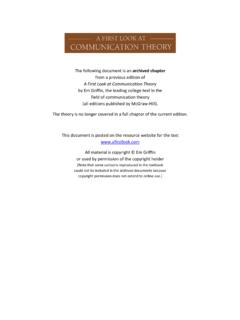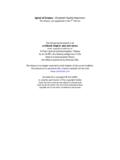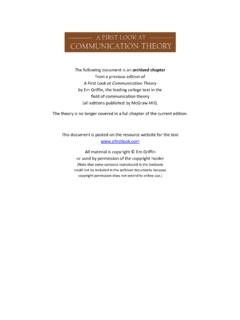Transcription of The following document is an archived chapter - A First Look
1 The following document is an archived chapter from a previous edition of A First Look at Communication theory by Em Griffin, the leading college text in the field of communication theory (all editions published by McGraw-Hill). The theory is no longer covered in a full chapter of the current edition. This document is posted on the resource website for the text All material is copyright Em Griffin or used by permission of the copyright holder (Note that some cartoons reproduced in the textbook could not be included in the archived documents because copyright permission does not extend to online use.) 6 P~+omnic i%eo y of Edward Hall Imagine that your First job after graduation is with a multinational oil company.
2 Because of your analytical skills, lack of prejudice, and interpersonal flexibility, your boss has selected you to be part of a negotiating team sent to Saudi Arabia. After checking into your hotel room, you take a long, cool shower and then head for the lobby to meet your counterpart with the Arabian firm. After the First five minutes, you know it s going to be a long day. Josef comes on way too strong. He stands so close that his face is only a foot away from yours. There s no letup in his penetrating gaze, and his voice is too loud. The smell of his breath is even more disconcerting, and you shudder at the feel of his hand on your arm. He strikes you suddenly as a pushy rug merchant.
3 As for Josef, you quickly confirm his worst fears about Americans. He sees you as devious and aloof because you avert your eyes, deny him your breath, and cover up your natural body scent. Despite his overtures of friend- ship, you coldly back away and hold him at arm s length. He begins to picture you as an Ugly American. He thinks it ll be a long day too. DISTANCE, THEHIDDENDI~MENSION If anthropologist Edward Hall had been sitting in the lobby, he would have given a knowing smile at the comical and, yet, tragic scene of the advancing Arab and the retreating American. While teaching at the Illinois Institute of Technology in Chicago, Hall introduced the termproxemics to designate the interrelated observations and theories of man s use of space as a specialized elaboration of culture.
4 30 You ll recall from the introduction to the section on messages that Whorfs hypothesis of linguistic relativity claims that language shapes our perception of reality. Hall believes space speaks to us just as loudly as words. That doesn t mean we listen, Hall entitled his book about distance The Hid- den Dimension because he s convinced that most spatial interpretation is out- side of our awareness. Since we don t even think about it, we never question the rightness of our actions. We learn tacit dos and don ts by observation of others rather than through systematic instruction. In fact most people are un- 60 proxemic theory 61 able to verbalize the cultural norms that dictate their proxemic behavior.
5 As the anthropological adage goes, We don t know who discovered water, but we re pretty sure it wasn t the fish. It usually takes an outside observer to spot our unquestioned cultural practices. A less-than-sensitive American once asked an Indonesian about the Balinese funeral custom of placing fresh fruit on a grave. When does your aunt climb out of her grave to eat the banana? he asked with a smirk. At the same time your uncle comes up to smell the flowers, was the matter-of-fact reply. THE HUMANANIMU'SUSEOFSPACE As an anthropologist and consultant on cross-cultural interaction, Hall would claim that the way you and your Saudi host perceive distance is culturally con- ditioned.
6 The Arab encodes his spatial language in a Middle Eastern dialect; you handle distance with a Yankee accent. But since Hall believes all cultures are rooted in a common biology, he uses studies of animal behavior to discover how humans will act. For instance, animals are territorial. Some mark their space with urine to stake a claim for privacy. Hall says people use furniture, walls, and fences to accomplish the same purpose. He maintains that animals respond in two distinct ways when they feel threatened-flight or fight. Distance is the critical factor. Beasts are unconcerned with potential intruders that remain outside an imaginary ring which marks the zone of threat.
7 Cross that unseen line, and the animal will flee. There s an inner circle of space that the animal will defend against all interlopers. If by speed or guile an intruder manages to penetrate that perimeter of defense before being noticed, most creatures will instinctively attack. People also have boundaries that mark their personal space. It s as if we walk around in an invisible bubble. Those with whom we are intimate may en- ter into the sphere without harm to either party. Invasion by others causes dis- tress. Because of our animal nature, we all have a zone of personal space, but the area of personal space differs greatly from culture to culture. Hall describes Arabs as a contact people whose ego is deep within the body.
8 To touch another is no offense. He claims that there are no Arabic words for privacy or rape. Josef meant no disrespect; he was merely making an un- conscious adjustment to establish an interpersonal distance that his culture held as proper. Hall also regards Latins and Southern Europeans as living in a contact culture. The United States is a noncontact culture. According to Hall our ego ex- tends approximately a foot and a half out from our body. We feel an aversion to casual touch and resent spatial intrusion. Given our cultural background, a re- treat in the hotel lobby seems like the right move. Asians and Northern Euro- peans share our distaste for indiscriminate contact.
9 Hall s bottom line advice for the international traveler is a corollary of an old adage: When in Rome, stand as the Romans stand. 62 chapter 6 RESEARCH WITH A RULER: PEOPLE SPACING IN AMERICA Hall has made a First attempt to determine the limits of American proxemic zones. He categorizes distance as intimate, personal, social, or public. Since we aren t born with a built-in yardstick, he also details how we use our sense re- ceptors to gauge the space between us. Not surprisingly, the boundaries fall at points of sensory shift. He acknowledges that he did his research on a small group of friends who were upper-middle-class Eastern professionals, so you ll want to take care not to consider his results the final word.
10 Unfortunately, con- tinued reiteration of his classification system makes it seem that these distances are set in stone. They re not. Intimate Distance (0 to 18 inches). This is the distance of playful wrestling and lovemaking. Enforced closeness in crowded elevators doesn t count; Hall is talking about the voluntarily selected gap between people who are drawn to each other. At this close range, vision is distorted and any vocal- ization is a whisper, moan, or grunt. Our main ways of judging the intervening space are through body heat, smell, and touch., As is true with gravity, Hall believes that the influence of two bodies on each other is inversely proportional not only to the square of the distance but possibly even the cube of the distance between them.










